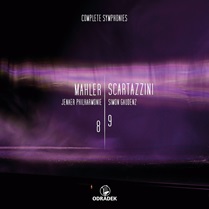Ein ambitiöses Programm ist auf der letzten Zielgeraden. Simon Gaudenz und die Jenaer Philharmonie haben in den letzten Jahren eine Integrale der Mahler-Symphonien zusammengestellt und dabei Mahlers Musik Reflexionen ihres Composers in Residence, Andrea Lorenzo Scartazzini, gegenübergestellt: Wie wirkt Mahlers Musik auf einen Komponisten des 21. Jahrhunderts?
Das vorliegende Programm bietet die Symphonien 8 und 9 mit jeweils zwei kurzen Spiegelungen von Andrea Lorenzo Scartazzini.
Chronologisch geht es von hinten los, mit Mahlers letzter vollendeter Symphonie. Simon Gaudenz geht die Symphonie eher zurückhaltend an, schafft einen warmen, ausbalancierten und expressiven Klang, ohne sich im Weltschmerz zu suhlen. Emotionale Ausbrüche lassen uns einen Komponisten, einen Menschen erahnen, der mit sich und der Welt ringt, der letzte Willenskräfte aufbringt, im Rondo noch einmal in bitterer Ironie auf das Leben schaut, ehe wir dann im Finale den Weg in die Stille, den Abschied, den inneren Frieden mit der Welt gehen.
Simon Gaudenz und die Jenaer Philharmonie schaffen es, diesen Spannungsbogen der großen Widersprüchlichkeiten und Brüche bis ins finale Pianissimo zu halten, ohne sich selbst als die großen Mahner aufzuspielen. Die Musik sagt alles – Mahler hat (fast) alles gesagt.
Nach dem Weltschmerz kommt die große Weltumarmung – die allein von der Besetzung her wuchtige 8. Symphonie. Auch hier hat Simon Gaudenz die nötige Sensibilität, das richtige Gespür, den Schöpfergeist nicht einfach sich austoben zu lassen. Kein Spektakel, dafür große Emotionen – klangmächtig, wenn vom Inhalt gefordert, aber auch ebenso zurückgenommen und verinnerlicht – wie etwa im Instrumentalvorspiel des zweiten Teils.
Verkappte Symphonie, Kantate mit opernhaften Zügen – die Schlussszene aus Faust II bietet viele Optionen. Simon Gaudenz geht den Weg des Mahler-Liedes, lässt textimmanent musizieren und führt uns dramaturgisch klar zur finalen Aussage: ‘Alles Vergängliche ist nur ein Gleichnis‘. Der Schöpfergeist wirkt ewig.
Der Basler Andrea Lorenzo Scartazzini hat den zwei Symphonien eigene Ansichten auf das Mahler-Universum gegenübergestellt, zwei Reflexionen, die allein schon programmatisch und vom Titel her Brücken schlagen: Enigma und Anima.
Enigma als Gedanken zur 9. Symphonie beginnt mit klaren Hinweisen auf Mahlers Klangsprache, die allmählich in eine eigene Deutung übergehen. Die Jenaer Philharmonie spielt dieses kurze Werke feinfühlig, zart und äußerst stimmungsvoll.
Anima als zeitgenössische Brücke zur 8. Symphonie greift auf einen Goethe-Text als Brückenbauer zurück – Gesang der Geister über den Wassern – und somit inhaltlich dem Finale der 8. Symphonie vor. Auch hier erleben wir ein Orchester mit höchstem Engagement, das mit oszillierenden Streicherklängen und austariert grundierten Bässen im Dialog mit der nuanciert dunkel eingefärbten Stimme der Altistin Evelyn Krahe steht.
The ambitious program is in its final home stretch. Simon Gaudenz and the Jena Philharmonic Orchestra have spent recent years putting together an integral of Mahler’s symphonies, juxtaposing his music with reflections by their composer-in-residence, Andrea Lorenzo Scartazzini. The question is: How does Mahler’s music affect a 21st-century composer?
The program features Symphonies 8 and 9, each accompanied by two brief reflections from Scartazzini.
The program chronologically starts at the end with Mahler’s last completed symphony. Gaudenz takes a restrained approach to the symphony, creating a warm, balanced, and expressive sound without wallowing in world-weariness. Emotional outbursts offer a glimpse into the composer and human being who struggled with himself and the world. He summoned his last bit of willpower and looked at life once again with bitter irony in the Rondo. Then, we take the path to silence, farewell, and inner peace with the world in the finale.
Gaudenz and the Jena Philharmonic maintain this arc of tension, full of great contradictions and ruptures, right up to the final pianissimo without playing themselves up as great admonishers. The music speaks for itself — Mahler has said (almost) everything.
After Weltschmerz comes the great world embrace — the Eighth Symphony, massive in instrumentation alone. Simon Gaudenz also has the necessary sensitivity and instinct to avoid letting the creative spirit run riot. There is no spectacle, only great emotion — powerful when the content requires it, yet equally restrained and internalized, as in the instrumental prelude of the second part.
A symphony in disguise and a cantata with operatic features, the final scene from Faust II offers many possibilities. Simon Gaudenz follows Mahler’s approach to song, allowing the music to be integral to the text. This leads us clearly to the final statement: « Everything transient is only a parable. » The creative spirit is eternal.
Andrea Lorenzo Scartazzini of Basel has given his own views on the Mahler universe. These two reflections build bridges in terms of their program and title alone: Enigma and Anima.
Enigma, a reflection on the Ninth Symphony, begins with clear references to Mahler’s tonal language that gradually lead to its own interpretation. The Jena Philharmonic Orchestra sensitively, delicately, and atmospherically performs this short piece.
As a contemporary bridge to the Eighth Symphony, Anima draws on a Goethe text, « Gesang der Geister über den Wassern, » as a bridge builder and thus precedes the finale of the Eighth Symphony in terms of content. Here, too, we experience an orchestra of the highest caliber, whose oscillating string sounds and balanced basses engage in dialogue with the nuanced, dark-hued voice of alto Evelyn Krahe.




















